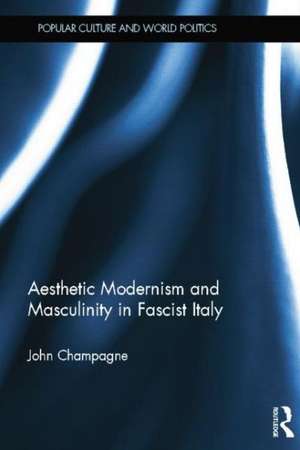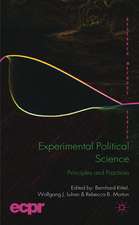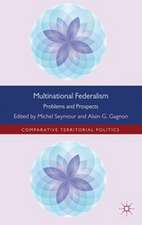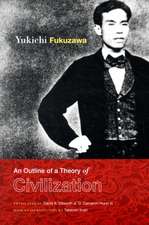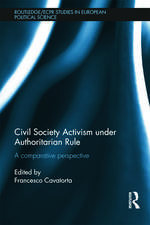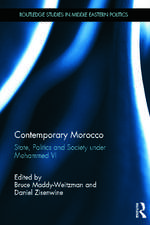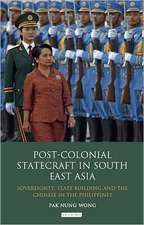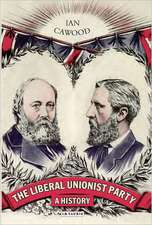Aesthetic Modernism and Masculinity in Fascist Italy: Popular Culture and World Politics
Autor John Champagneen Limba Engleză Paperback – 23 iun 2014
Champagne seeks to evaluate how the aesthetic analysis of the artefacts explored offer a more sophisticated and nuanced understanding of what world politics is, what is at stake when something – like masculinity – is rendered as being an element of world politics, and how such an understanding differs from more orthodox ‘cultural’ analyses common to international relations.
Providing a significant contribution to understandings of representations of masculinities in modernist art, this work will be of great interest to students and scholars of gender studies, queer studies, political science, Italian studies and art history.
| Toate formatele și edițiile | Preț | Express |
|---|---|---|
| Paperback (1) | 335.51 lei 6-8 săpt. | |
| Taylor & Francis – 23 iun 2014 | 335.51 lei 6-8 săpt. | |
| Hardback (1) | 850.19 lei 6-8 săpt. | |
| Taylor & Francis – 16 aug 2012 | 850.19 lei 6-8 săpt. |
Din seria Popular Culture and World Politics
-
 Preț: 311.41 lei
Preț: 311.41 lei -
 Preț: 309.94 lei
Preț: 309.94 lei -
 Preț: 441.74 lei
Preț: 441.74 lei -
 Preț: 242.12 lei
Preț: 242.12 lei - 17%
 Preț: 237.93 lei
Preț: 237.93 lei -
 Preț: 412.37 lei
Preț: 412.37 lei - 19%
 Preț: 243.74 lei
Preț: 243.74 lei -
 Preț: 449.41 lei
Preț: 449.41 lei -
 Preț: 389.38 lei
Preț: 389.38 lei - 14%
 Preț: 336.71 lei
Preț: 336.71 lei - 17%
 Preț: 245.56 lei
Preț: 245.56 lei -
 Preț: 383.33 lei
Preț: 383.33 lei -
 Preț: 389.38 lei
Preț: 389.38 lei -
 Preț: 432.87 lei
Preț: 432.87 lei -
 Preț: 381.43 lei
Preț: 381.43 lei -
 Preț: 383.71 lei
Preț: 383.71 lei -
 Preț: 362.05 lei
Preț: 362.05 lei - 21%
 Preț: 180.90 lei
Preț: 180.90 lei -
 Preț: 383.71 lei
Preț: 383.71 lei -
 Preț: 436.14 lei
Preț: 436.14 lei -
 Preț: 324.45 lei
Preț: 324.45 lei - 18%
 Preț: 999.34 lei
Preț: 999.34 lei
Preț: 335.51 lei
Preț vechi: 400.43 lei
-16% Nou
Puncte Express: 503
Preț estimativ în valută:
64.22€ • 69.78$ • 53.98£
64.22€ • 69.78$ • 53.98£
Carte tipărită la comandă
Livrare economică 21 aprilie-05 mai
Preluare comenzi: 021 569.72.76
Specificații
ISBN-13: 9781138808157
ISBN-10: 1138808156
Pagini: 232
Ilustrații: 10 black & white illustrations, 10 black & white halftones
Dimensiuni: 156 x 234 x 15 mm
Greutate: 0.32 kg
Ediția:1
Editura: Taylor & Francis
Colecția Routledge
Seria Popular Culture and World Politics
Locul publicării:Oxford, United Kingdom
ISBN-10: 1138808156
Pagini: 232
Ilustrații: 10 black & white illustrations, 10 black & white halftones
Dimensiuni: 156 x 234 x 15 mm
Greutate: 0.32 kg
Ediția:1
Editura: Taylor & Francis
Colecția Routledge
Seria Popular Culture and World Politics
Locul publicării:Oxford, United Kingdom
Public țintă
Postgraduate and UndergraduateCuprins
Introduction: Beyond Virility, Chapter 1. Fascism, Modernism, and the Contradictions of Capitalism, Chapter 2. Pirandello Fascista? Modernism and The Theater of Masculinity Chapter 3. The Dandy, the Mystic, and the Tonalists: Italian Modernist Painting and the Male Body Chapter 4. “A Glimpse Through an Interstice Caught: Fascism and Mario Castelnuovo-Tedescos Calamus Songs” Chapter 5. Giorgio Bassani and Italian “Queers” of the 1930s” Conclusion: “Beyond” Fascism?
Notă biografică
John Champagne is an Associate Professor of English at Penn State Erie, the Behrend College, and a Visiting Professor of Communications at John Cabot University, Rome. He writes on gender and sexuality in modern culture; a critic and novelist, he is the author of three previous books.
Recenzii
"...this is a compelling, rich, and provocative study that provides plenty of food for thought and invites further investigation in this vein. " Charlotte Rose, Universty of Birmingham, Modern Language Review
Descriere
Aesthetic Modernism and Masculinity in Fascist Italy is an interdisciplinary historical re-reading of a series of representative texts that complicate our current understanding of the portrayal of masculinity in the Italian fascist era.
Champagne seeks to evaluate how the aesthetic analysis of the artifacts explored offer a more sophisticated and nuanced understanding of what world politics is, what is at stake when something – like masculinity – is rendered as being an element of world politics, and how such an understanding differs from more orthodox ‘cultural’ analyses common to international relations.
Champagne seeks to evaluate how the aesthetic analysis of the artifacts explored offer a more sophisticated and nuanced understanding of what world politics is, what is at stake when something – like masculinity – is rendered as being an element of world politics, and how such an understanding differs from more orthodox ‘cultural’ analyses common to international relations.
